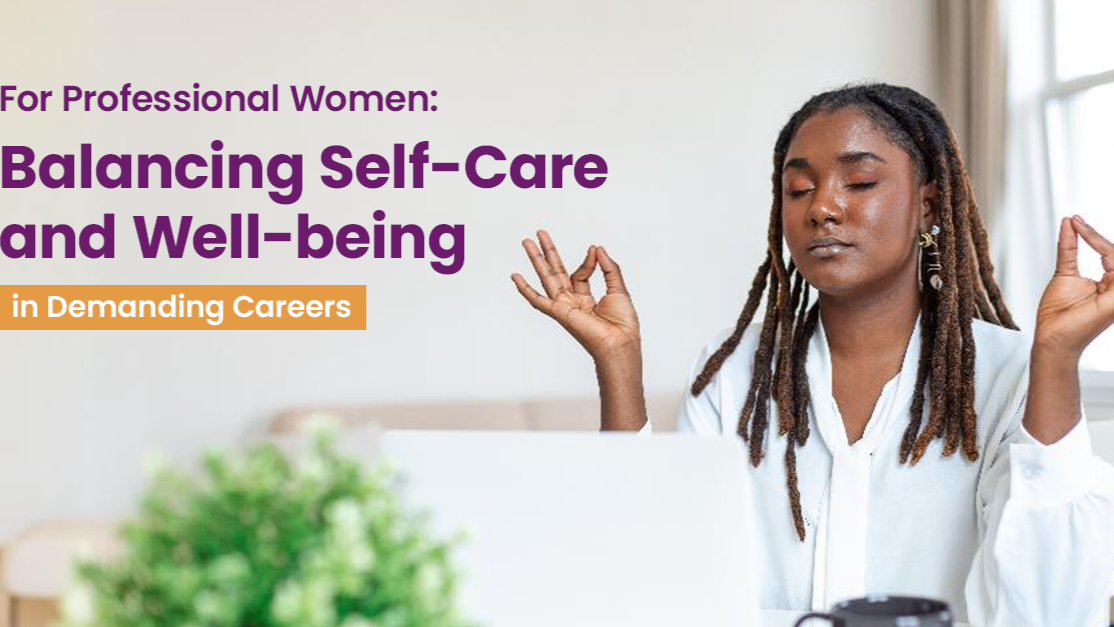The Executive Ally Co.
For Professional Women: Balancing Self-Care and Well-being in Demanding Careers

Did you know? In the U.S., burnout among professional women is at a critical high in 2024, with over half reporting feelings of burnout. Women in leadership are also leaving at record rates, driven by stress, lack of recognition, and limited mental health resources.
- Report by NAMI
- Report by NAMI
In the whirlwind of demanding careers, self-care can feel like an afterthought for many women. But taking time for yourself is key to staying healthy, both physically and mentally. This article shares effective and efficient tips to help you work self-care into your busy life, so you can keep feeling strong and balanced in both your personal and professional worlds.
Understanding the Challenges Across Age Groups
Professional women encounter a variety of challenges that vary significantly across different life stages.
Young Professionals (20s-30s)
Senior Professionals (50s and Beyond)
Young Professionals (20s-30s)
Women in their 20s and 30s often find themselves navigating the complexities of starting their careers while establishing their identities in competitive environments. Many face immense pressure to succeed rapidly, which can lead to anxiety and burnout. According to a report from the American Psychological Association, younger women are more likely to experience burnout than their male counterparts due to heightened expectations and workplace dynamics that often undervalue their contributions.
Mid-Career Women (30s-50s)
As women enter their mid-career stage, they frequently juggle demanding jobs alongside significant family responsibilities, such as caring for children or aging parents. The phenomenon known as the "second shift," where women take on most household and caregiving tasks after a full day of work, adds to their stress levels.
This dual burden can lead to chronic stress, dissatisfaction, and feelings of inadequacy both at work and at home.
Senior Professionals (50s and Beyond)
Women in their 50s and beyond often grapple with ageism and a lack of representation in leadership roles. They also face the challenge of maintaining their health while navigating career transitions, whether that involves retiring or shifting to advisory roles. The pressure to mentor younger women while managing their own well-being can be particularly taxing.
Causes of Burnout Among Professional Women
Understanding the root causes of burnout is essential for addressing this issue effectively. Here are some of the most significant factors contributing to burnout among professional women:
- High Expectations: Women often set high standards for themselves and feel pressure to excel in demanding roles while balancing family and personal responsibilities. This constant striving for perfection can lead to overwhelming stress.
- Lack of Support: Many women report feeling unsupported in the workplace, particularly regarding mental health resources and recognition for their contributions. The absence of mentorship or advocacy can exacerbate feelings of isolation and disconnection.
- Workplace Culture: A toxic work environment that prioritizes productivity over employee well-being can contribute to burnout. Companies that discourage taking time off or fail to acknowledge the importance of self-care can exacerbate stress levels
- Inadequate Work-Life Balance: Many women struggle to set clear boundaries between their professional and personal lives. The inability to disconnect from work can lead to chronic stress and a feeling of being constantly "on call".
Why Self-Care Matters
Prioritizing self-care is essential for women in demanding careers for several compelling reasons:
- Physical Health: Chronic stress can lead to serious health issues, including cardiovascular problems and weakened immune systems. According to the Mayo Clinic, self-care practices such as regular exercise and proper nutrition significantly improve physical well-being. Regular physical activity has been linked to better mood, increased energy levels, and enhanced overall health.
- Mental Resilience: Engaging in self-care helps build mental resilience, allowing women to cope better with workplace challenges. Mindfulness and stress management techniques, such as meditation or yoga, can reduce anxiety and improve focus. Practicing mindfulness has been shown to enhance emotional regulation and cognitive flexibility, essential skills for navigating a demanding work environment.
- Career Longevity: Maintaining well-being can lead to increased job satisfaction and lower turnover rates. Companies benefit from retaining experienced women who contribute to a diverse and inclusive work environment. Employees who prioritize self-care are often more productive, creative, and engaged.
- Work-Life Balance: Prioritizing self-care fosters a healthier work-life balance, allowing women to manage their professional and personal responsibilities more effectively. Establishing a balance is crucial for long-term success and satisfaction in both personal and professional realms.
Actionable Steps to Enhance Your Well-Being
To effectively combat burnout and enhance well-being, professional women can adopt various strategies. Here are actionable tips to consider:
Walking Heals
Nourishing Mindfully
Create a Minace
Start Listening
Scheduled Breaks
Set Daily Intentions
Vital Movements
Balancing self-care and well-being in demanding careers is crucial for professional women at every stage of life. By understanding the challenges they face and implementing mindful practices, women can combat burnout and foster a healthier work-life balance. Prioritizing self-care not only benefits individual well-being but also contributes to a more inclusive and productive work environment. Remember, taking care of yourself is not a luxury—it's a necessity for thriving in both personal and professional realms.
Breathing Practice
- Practice Deep Breathing: Take a few moments throughout the day to focus on your breath. Inhale deeply through your nose for a count of four, hold for four, and exhale through your mouth for four. This can help reduce stress and improve concentration
Reminders: Use reminders on your phone or sticky notes on your desk to prompt breathing exercises at regular intervals.
Walking Heals
- Take Walks: During breaks, step outside for a brief walk. Focus on the sensations of your feet hitting the ground and the sights and sounds around you. This can help clear your mind and rejuvenate your spirit .
Nourishing Mindfully
- Eat with Intention: Use lunchtime as an opportunity to practice right and healthy eating. Take the time to savor each bite, noticing the flavors and textures of your food. Avoid distractions like your phone or computer during meals to fully engage with the experience .
Create a Minace
- Declutter Your Space: A clean and organized workspace can promote a sense of calm and focus. Take a few minutes at the end of each day to tidy up your desk .
Start Listening
- Engaging listening: Practice active listening by giving your full attention to colleagues during discussions. Avoid interrupting and focus on understanding their perspectives. This not only fosters better relationships but also reduces miscommunication .
Scheduled Breaks
- Incorporandfulness Breaks: Schedule brief breaks throughout your workday to step back and recharge. Use these moments to meditate, stretch, or simply sit quietly and reflect .
Utilize Technology
- Use Mindfulness Apps: Apps like Headspace or Calm that offer guided meditations and mindfulness exercises. You can use these during your breaks or when you need a moment of calm .
Set Daily Intentions
- Start Each Day with an Intention: Take a few hours in the morning to set a positive intention for the day. This could be something like “I will approach challenges with calm” or “I will prioritize my well-being.” Reflecting on your intention throughout the day can keep you grounded .
Vital Movements
- Incorporate Stretching: Take short breaks to stretch your can relieve tension and improve circulation, especially if you sit for long periods. Focus on the sensations in your muscles as you stretch .
Balancing self-care and well-being in demanding careers is crucial for professional women at every stage of life. By understanding the challenges they face and implementing mindful practices, women can combat burnout and foster a healthier work-life balance. Prioritizing self-care not only benefits individual well-being but also contributes to a more inclusive and productive work environment. Remember, taking care of yourself is not a luxury—it's a necessity for thriving in both personal and professional realms.


